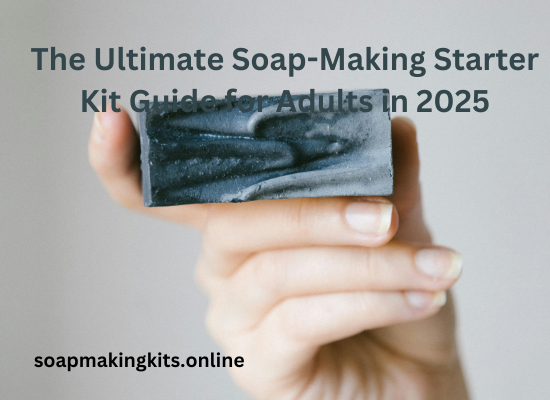Soap making is an enjoyable, creative, and cost-effective hobby that lets you craft natural, skin-friendly soaps at home. A good starter kit provides everything you need to personalize colors, scents, and designs. Whether for self-care or gifting, homemade soap gives you full control over the ingredients for a healthier, more nourishing cleanse!
Have you ever wanted to make your own handmade soap but didn’t know where to begin? You’re not alone! Soap making is an enjoyable and relaxing hobby that lets you craft personalized soaps while controlling the ingredients—perfect for sensitive skin and eco-friendly living.
This guide will walk you through choosing the best soap-making starter kit for adults, complete with step-by-step instructions, expert tips, and beginner-friendly advice. Whether you’re starting fresh or refining your skills, this guide has everything you need. Let’s get started!

Why Soap Making is the Perfect Hobby for Adults
Soap making is more than just a craft—it’s a therapeutic and rewarding experience. Here’s why it’s gaining popularity:
Creative Expression: Design unique soaps with colors, scents, and custom shapes.
Eco-Friendly: Reduce plastic waste with sustainable, biodegradable soaps.
Cost-Effective: With the best and special base, you can make a good quality soap at home and save your money, etc.
Customizable: Choose skin-friendly ingredients tailored to your needs.
Read more: Best homemade peppermint soap recipe for summer
What to Look for in a Soap-Making Starter Kit
Not all soap-making kits are created equal. Here’s what to consider:
1. Must-Have Tools & Ingredients
A high-quality starter kit should include:
Base Oils: Olive oil, coconut oil, or shea butter.
Lye (Sodium Hydroxide): Essential for saponification.
Molds: Silicone molds for easy soap removal.
Fragrances & Colorants: Essential oils and natural dyes.
Safety Gear: To protect yourself, it is very important to have full goggles, gloves, and a mask to protect yourself.
2. Easy-to-Follow Instructions
Look for kits with detailed guides or video tutorials to simplify the process.
3. Quality Over Quantity
Avoid kits filled with unnecessary extras. Focus on high-quality, essential ingredients.
Top 5 Soap-Making Starter Kits for Adults in 2025
These beginner-friendly kits offer the best value and quality:
Bramble Berry Beginner’s Soap-Making Kit – Comes with cold-process essentials and step-by-step guides.
CraftZee Soap-Making Kit – Ideal for melt-and-pour beginners, featuring fun molds and vibrant colors.
Nature’s Oil Soap Making Kit – Focuses on natural, eco-friendly ingredients, perfect for sensitive skin.
Stephenson’s Cold Process Soap Kit – Includes lye, oils, and detailed safety instructions for beginners.
Sapphire Hill DIY Soap Kit – Features luxurious spa-quality soap additives like shea butter and oatmeal.
Read more: Goat Milk Soap Making Supplies Kit: Your 2025 Guide to Crafting Natural Skincare (+ Pro Tips)
Step-by-Step Guide to Making Your First Bar of Soap
Step 1: Gather Your Supplies
Ensure you have everything from your starter kit ready.
Step 2: Prepare Your Workspace
Work in a well-ventilated area.
Wearing full goggles, gloves, and a mask is very important to protect yourself.
Step 3: Mix the Lye Solution
Add the lye to the water very slowly and never move around, just focus on the lye.
Stir until dissolved and let cool.
Step 4: Blend Oils and Lye
Mix your base oils.
Add the lye solution very well and then continue to blend until you know that it has completely thickened and reached a custard consistency.
Step 5: Add Fragrances & Colors
Stir in essential oils and natural colorants for a personalized touch.
Step 6: Pour & Set
Pour into molds and tap gently to remove air bubbles.
Let harden for 24–48 hours.
Step 7: Cure Your Soap
Allow your soap to cure for 4–6 weeks to harden and improve quality.
Read more: Best homemade sea salt soap recipe for skin
Common Mistakes to Avoid
Skipping Safety Precautions: Always wear protective gear when handling lye.
Overcomplicating Designs: Start simple and experiment as you gain confidence.
Using Low-Quality Ingredients: High-quality oils and fragrances produce the best results.
Read more: 7 Proven Ways to Master Melt and Pour Soap Making Kits in 2025 (+ Expert Tips)
Conclusion
Soap making is a fun and rewarding hobby that lets you craft beautiful, eco-friendly soaps from home. With the right starter kit, safety precautions, and a little creativity, you’ll be making high-quality soaps in no time!
Do you have questions or want to share your experience? Drop a comment below! And don’t forget to share this guide with fellow beginners.
Read more: DIY Clay Soap The best way to make soap at home
FAQS
1. What’s the best soap-making method for beginners?
Melt-and-pour is the easiest, as it skips lye handling.
2. Can I make soap without lye?
No, lye is essential for saponification, but pre-made melt-and-pour bases are lye-free.
3. How long does homemade soap last?
Properly cured soap lasts up to a year if stored in a cool, dry place.
4. Is soap-making safe?
“Soap-making starter kit for adults with molds and ingredients”